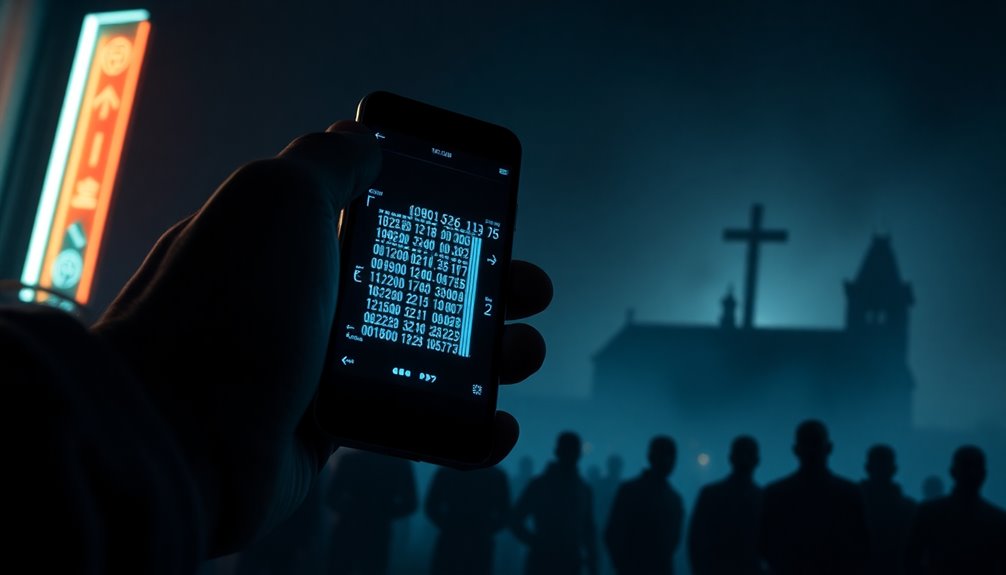You might be surprised to learn that the Mark of the Beast could be closer than you think. With over 20% of Swedes using microchip implants for transactions, the technological landscape echoes biblical warnings. Experts note that these advancements raise concerns about privacy and allegiance to systems that could mirror the mark described in Revelation. As you consider your daily choices, it's essential to evaluate how emerging technologies fit into your values and beliefs. There's much debate and insight about the implications of this trend, so keep exploring to uncover deeper understandings of these pressing questions and concerns.
Key Takeaways
- Technological advancements, like microchips in daily transactions, raise concerns that echo biblical warnings about the "Mark of the Beast."
- The ongoing exploration of digital currencies by BRICS nations suggests a shift towards centralized economic systems, reminiscent of the mark's implications.
- Many theologians view the mark as a metaphor for loyalty to secular powers, rather than a literal mark, emphasizing moral choices.
- Daily decision-making in a tech-driven world requires alignment with personal beliefs, fostering spiritual preparedness amid emerging technologies.
- Ethical discussions among experts are crucial for navigating the societal impacts of technology, addressing fears around privacy and control linked to the mark.
Introduction
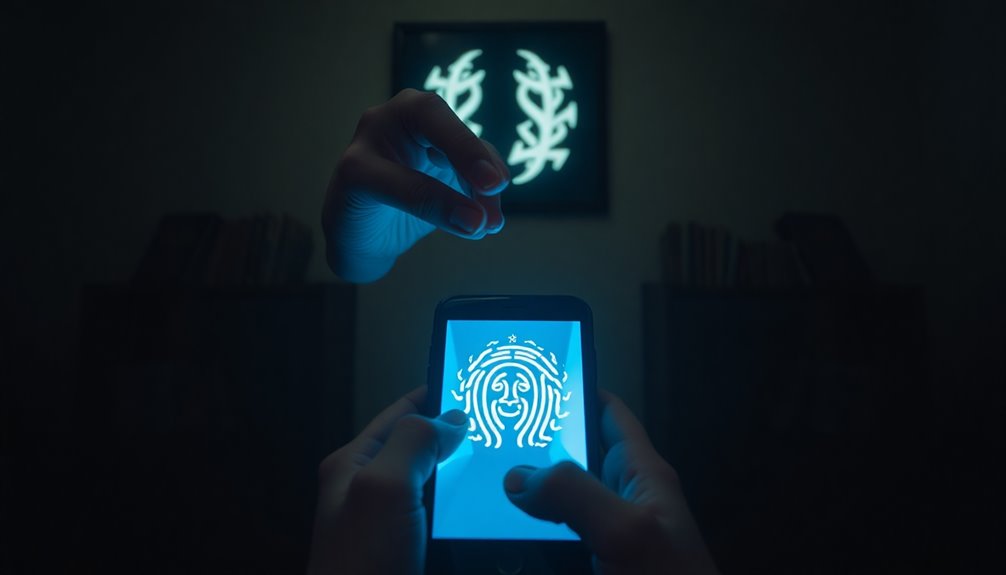
In recent years, as technology advances at a rapid pace, the concept of the "Mark of the Beast" has gained renewed attention. With the rise of microchip technology and innovations like Neuralink, the idea of buying and selling through implanted devices seems increasingly plausible.
Experts are drawing unsettling parallels between these modern advancements and the biblical implications of the mark, especially as global economies shift away from traditional currencies like the US dollar.
Countries like Sweden have already begun using microchips for everyday transactions, sparking concerns about privacy and surveillance that echo the fears associated with the Mark of the Beast.
As BRICS nations explore alternative payment systems, the potential for a worldwide digital currency could align with prophetic warnings about economic control linked to the mark.
In light of these developments, the urgency for spiritual preparedness becomes clear. Bible verses, particularly Revelation 14:9, highlight the eternal consequences of accepting the mark.
This underscores the importance of staying informed and aware of current technological advancements, as they may have profound implications for your faith and understanding of Jesus Christ's teachings.
Biblical Context of the Mark

In discussing the biblical context of the mark, you'll want to start with key references from Revelation 13, which outlines its significance in relation to economic control.
You'll also find that secondary references throughout the Bible provide deeper insight into the implications of accepting this mark.
Understanding these texts can help clarify the urgency and moral considerations surrounding this powerful symbol.
Primary Bible References
The Bible offers critical insights into the concept of the "mark of the beast," primarily found in Revelation 13:16-18. This passage states that the mark will be placed on the right hand or the forehead, allowing individuals to buy and sell.
One thing the Bible says is that accepting this mark signifies allegiance to a system that opposes God. It raises serious concerns about economic control and spiritual deception in our modern world.
In Revelation 14:9, the Bible warns of severe consequences for those who accept the mark, emphasizing the urgency for believers to remain vigilant. This mark isn't just a physical identifier; it symbolizes a deeper rejection of faith and loyalty to God.
The number 666, often associated with the mark, signifies humanity's imperfection and failure to align with divine will, making it a potent symbol of spiritual peril.
Biblical prophecy suggests that the emergence of the mark will coincide with a period of tribulation. Therefore, being aware of these scriptural warnings helps you prepare for potential challenges to your faith in the future.
Stay alert and grounded in your beliefs as you navigate these prophetic implications.
Secondary Bible References
Many people may not realize that the concept of the mark of the beast is deeply rooted in various biblical texts beyond Revelation. For instance, Revelation 13:16-17 details how this mark will be placed on the right hand or forehead, making it essential for buying and selling. This idea resonates with today's advancements in microchip and digital currency technologies.
The number 666, linked with the mark, symbolizes imperfection and incompleteness, contrasting sharply with the divine completeness of the number seven. This raises significant concerns about the implications of adopting such technology.
Moreover, Revelation 14:9 warns of dire consequences for those who receive the mark, highlighting a spiritual dimension to this choice. Scholars suggest that the mark may not merely be a physical symbol but also signify allegiance to a system opposed to God's authority.
This brings broader themes of faith and morality into play as we navigate technological advancements. The urgency in Revelation emphasizes the need for spiritual preparedness and discernment, urging you to consider how modern technology aligns with biblical prophecy.
It's crucial to remain vigilant about the choices you make in this rapidly changing world.
Ancient Roman Economic Practices
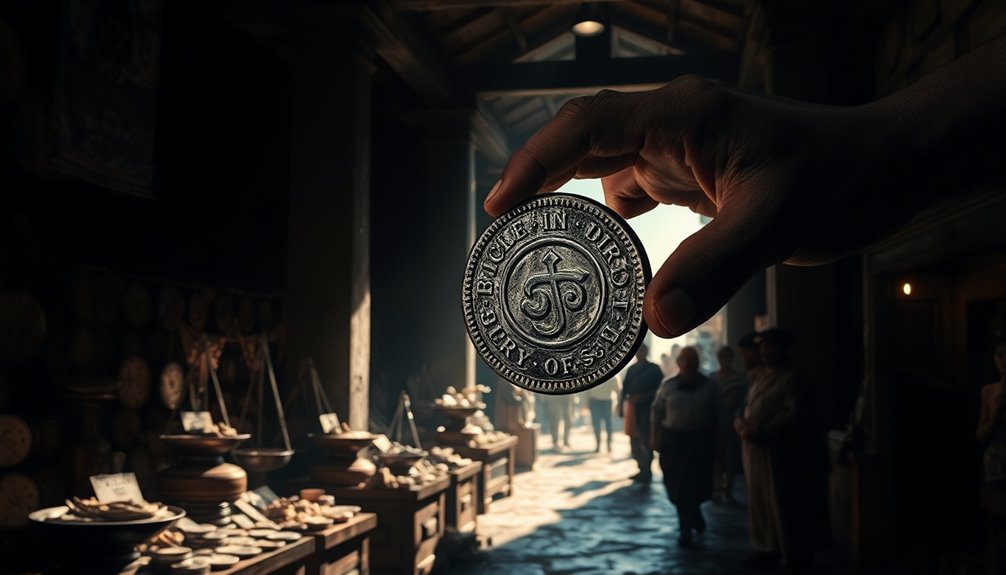
Economic prosperity in ancient Rome stemmed from a sophisticated system of coinage and trade that interconnected diverse regions. The denarius, the most common currency, facilitated economic transactions and enabled merchants to engage in long-distance trade. You'd find goods like silk from China and spices from India being transported along established routes, including the famous Silk Road.
Agriculture was the backbone of the Roman economy, with large estates known as latifundia dominating production. These estates relied on both free laborers and slaves, showcasing the varied labor systems that fueled the economy.
Additionally, you'd see the emergence of public banking systems, like the argentarii, which allowed for loans and deposits, further contributing to commerce, especially in urban centers.
Taxation also played a crucial role in this economic landscape. Romans often collected taxes in the form of goods or services rather than currency, funding essential public works and military campaigns.
Through these intricate economic practices, ancient Rome established a foundation that not only supported its vast empire but also influenced future economic systems across the globe. Furthermore, the reliance on renewable resources not only promoted economic stability but also contributed to a sustainable economic model that has implications for modern eco-friendly practices.
Symbolism of the Number 666

In discussions about the symbolism of the number 666, its association with the "mark of the beast" from Revelation 13:18 stands out prominently. This number symbolizes imperfection and incompleteness, contrasting sharply with the divine perfection represented by the number 7.
As you delve deeper, you'll find that 666 is often linked to economic control, emphasizing its relevance in today's financial systems and technologies. This connection raises eyebrows, especially when considering how the mark allows individuals to buy and sell.
Some interpretations even suggest ties to Emperor Nero through gematria, where his name equates to 666. This historical context adds a layer of ominous meaning to the number.
The repetition of the number 6 three times—666—symbolizes ultimate human rebellion against God, indicating a final rejection of divine authority. This notion resonates strongly with ongoing debates about technological advancements, particularly concerning microchips and neural implants, which some fear may fulfill prophetic warnings.
Ultimately, the symbolism of 666 invites you to reflect on the implications of your choices in a rapidly evolving world. Understanding this number's significance can help you navigate the moral complexities we face today.
Misunderstanding Revelation's Symbolism

You might be surprised to learn that many common misconceptions about the "mark of the beast" stem from a misunderstanding of Revelation's rich symbolism.
Instead of viewing it as a literal mark or a prophecy about future technologies, consider how it reflects choices about loyalty and faith.
This perspective can help dispel fear and skepticism surrounding biblical prophecy and its relevance today.
Debunk Common Misconceptions
Misunderstanding the symbolism in Revelation can lead many to get caught up in fear and speculation about the mark of the beast. Instead of viewing it as a literal mark, consider that it often symbolizes a broader allegiance to secular powers or systems.
The infamous number 666 isn't just a cryptic code; it signifies imperfection and incompleteness, standing in stark contrast to the divine perfection represented by the number 7.
Historically, interpretations of the mark have varied. Some experts argue it referred to the Roman Empire's demand for loyalty, rather than a futuristic technology. This shows how a literal reading can obscure the deeper meanings embedded in the text.
Revelation employs rich symbolic language, which serves to convey profound spiritual truths rather than straightforward predictions.
Understanding the cultural and historical context of Revelation can clarify that the mark may act as a metaphor for the moral and ethical choices you face in a corrupt world. By shifting your perspective from a literal interpretation to a symbolic understanding, you can alleviate fear and gain deeper insights into the text's true message.
Skepticism About Biblical Prophecy
Skepticism about biblical prophecy often arises from the complex and layered symbolism found in texts like Revelation. Many skeptics point out that terms like the "mark of the beast" reflect historical and cultural contexts rather than foreshadowing modern technologies like microchips or Neuralink. Instead of viewing the number 666 as a literal mark, some scholars argue it references Emperor Nero and his persecution of early Christians.
Critics of apocalyptic interpretations emphasize the importance of recognizing Revelation as a work of apocalyptic literature, rich in metaphor and allegory, rather than straightforward prophecy. They warn against the danger of applying contemporary issues to ancient texts, which often leads to fear-based interpretations that overlook the text's intended message of hope and resilience amidst persecution.
Many theologians advocate for a focus on the ethical and spiritual implications of Revelation. Instead of fixating on literal interpretations, they encourage believers to seek a deeper understanding of its themes.
Daily Decision-Making Strategies
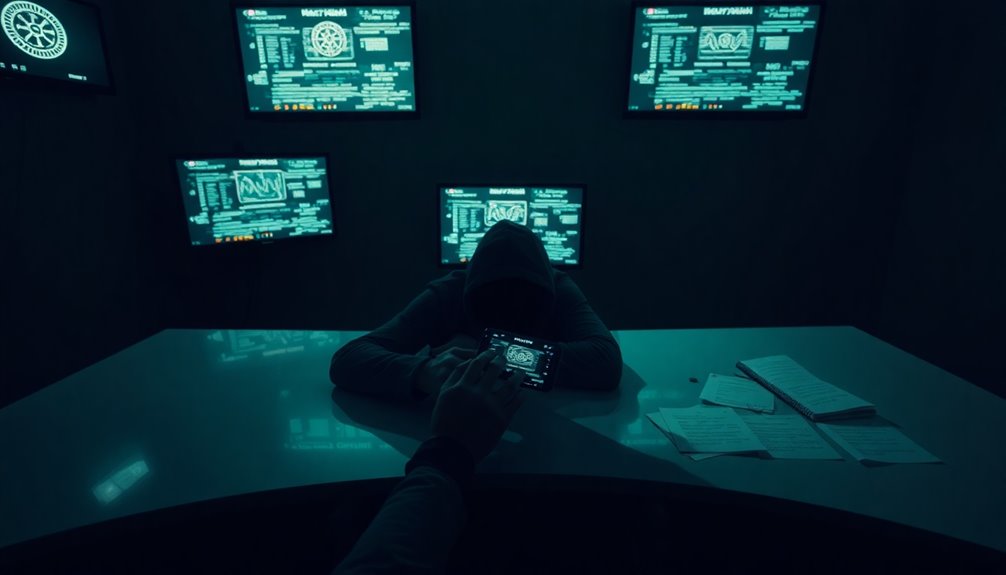
In today's tech-driven world, you're faced with daily choices that can shape your life and beliefs.
By integrating faith-based discussions into your decision-making strategies, you can ensure your choices reflect your values.
Let's explore how these strategies can streamline your decisions while aligning with your faith.
Daily Choices and Technology
Navigating daily choices around technology requires a keen awareness of how these decisions can impact your privacy and security. As microchip and Neuralink technologies become more integrated into our lives, you must consider how accepting these innovations affects your personal data.
Ethical implications arise when you decide whether to embrace or reject these advancements, particularly concerning financial transactions and your security.
Understanding digital currencies is crucial as cash usage declines and a potential global digital currency emerges. It's essential to reflect on how these choices align with your values and beliefs. Are you comfortable with the implications of a cashless society? Additionally, exploring options like a Bitcoin IRA can provide tax-efficient growth for your retirement savings while navigating this new financial landscape.
Being proactive in monitoring developments related to these technologies empowers you to make informed choices. Stay updated on the risks and benefits associated with digital currencies and microchips. This awareness can guide your daily decisions, allowing you to navigate the evolving landscape of technology while safeguarding your privacy.
Ultimately, your daily choices shape not only your financial future but also the ethical framework within which you operate. By making intentional decisions, you can ensure that your technology use aligns with your personal beliefs and values.
Faith-Based Technology Discussions
Many individuals find themselves grappling with the ethical implications of emerging technologies in light of their faith. With microchip technology gaining popularity in countries like Sweden, you might wonder if this aligns with the biblical warnings of the "mark of the beast."
As seamless transactions and identification become commonplace, it's crucial to consider how these developments could affect your spiritual beliefs and practices.
The rise of Neuralink and brain-computer interfaces raises significant questions about autonomy and control. You should reflect on whether embracing such technologies might compromise your freedom in ways that echo biblical prophecies.
Similarly, the shift towards cashless societies and digital currencies can feel alarming, as it hints at a centralized system for buying and selling, potentially aligning with prophetic ideas.
Being aware of the surveillance and privacy violations tied to these technologies is vital. Engaging in faith-based discussions allows you to explore your spiritual and ethical responsibilities in daily decision-making.
As these narratives evolve, consider how you can participate in thoughtful dialogues within your faith community, ensuring your choices reflect your values while navigating the complexities of modern technology. Additionally, understanding the importance of emotional alignment can help you maintain your values amidst these technological advancements.
Implications for Modern Society

As technology advances, the implications for modern society become increasingly profound, especially with the rise of microchip and brain implant innovations. In countries like Sweden, cashless transactions are becoming the norm, sparking fears that these changes echo the "mark of the beast" described in Revelation 13.
The introduction of Neuralink's brain chip, which allows you to control devices with your thoughts, raises ethical dilemmas. Are we inching closer to a society where acceptance of these technologies is mandatory, akin to biblical mandates?
Moreover, the BRICS nations are pushing to replace the US dollar with digital currencies, potentially creating a global economic system that aligns with apocalyptic prophecies about centralized authority. This shift could mean that your ability to buy or sell may hinge on your compliance with such systems.
Concerns about privacy and surveillance surrounding microchip implants reflect biblical warnings about losing autonomy and the spiritual consequences of taking the mark.
The urgency to avoid this mark, highlighted in Revelation 14:9, resonates with ongoing debates about the moral implications of these technologies. You must stay vigilant as society navigates this digital landscape, weighing the cost of convenience against ethical considerations.
Additional Resources
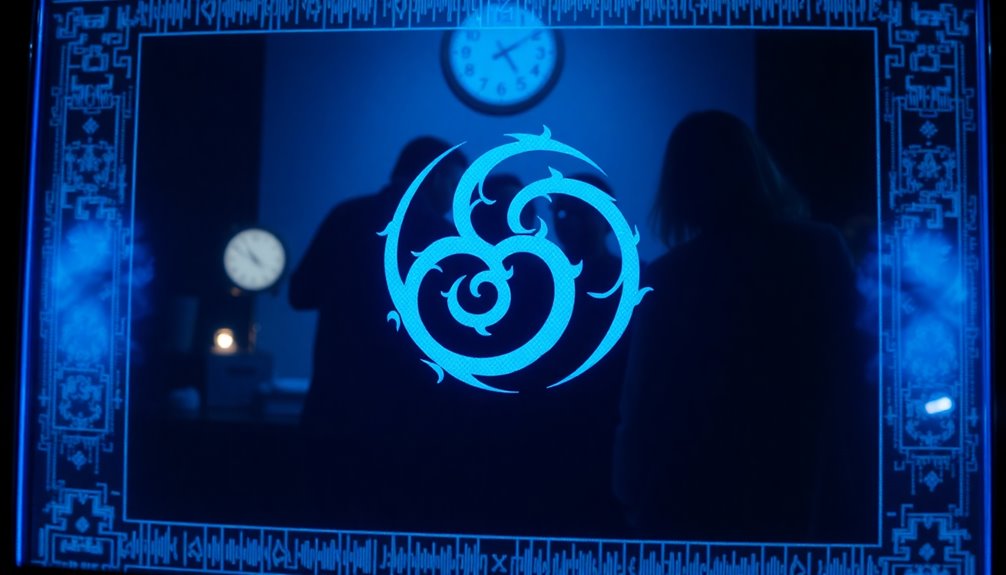
Understanding the complexities of the mark of the beast and its implications requires access to a variety of resources. To grasp how advancements in microchip technology are reshaping our world, you should explore expert analyses on identification and payment systems.
Look for reports discussing the rise of digital currencies, especially from BRICS nations, as they may present a path toward a centralized financial system that resonates with biblical prophecies.
You'll also want to investigate ethical discussions surrounding Neuralink and similar technologies. Research how these innovations might lead to direct mind control, and consider the spiritual ramifications tied to such advancements.
Advocacy groups are raising critical concerns about surveillance and privacy loss linked to microchip adoption, so familiarize yourself with their findings to understand public sentiment.
Engaging with ongoing dialogues among theologians, economists, and technologists is essential. They're exploring the intersection of emerging technologies with biblical prophecies, providing insights that can help you navigate these complex issues. Additionally, understanding the importance of financial management can offer a framework for evaluating the economic impacts of these technologies on society.
Frequently Asked Questions
What Are Common Misconceptions About the Mark of the Beast?
You might believe the Mark of the Beast is a literal tattoo or microchip, but that's a common misconception.
Many think it's only associated with the end times, overlooking its symbolic meaning in various contexts.
Some assume it's solely linked to technology, ignoring historical interpretations.
It's essential to recognize that interpretations vary widely, and understanding the cultural and spiritual significance behind it can provide a more nuanced view than what you might expect.
How Do Different Religions Interpret the Mark of the Beast?
Different religions interpret the Mark of the Beast in various ways.
In Christianity, it's often seen as a symbol of allegiance to evil or the Antichrist. Meanwhile, some interpret it metaphorically, viewing it as a warning against moral compromise.
In Islam, some believe it signifies a test of faith.
You'll find that interpretations can vary widely, reflecting differing beliefs about good, evil, and the end times across cultures and faith traditions.
Are There Historical Figures Associated With the Mark of the Beast?
When you explore the concept of the Mark of the Beast, you'll find various historical figures associated with it. Many scholars link it to Emperor Nero, interpreting the number 666 as a coded reference to him.
Others cite figures like Charlemagne or even modern political leaders as potential embodiments of this mark. Each interpretation reflects cultural fears and societal issues, illustrating how the mark evolves through history, adapting to different contexts and concerns.
What Role Does Technology Play in Discussions About the Mark?
Technology plays a significant role in discussions about the mark. You might notice how advancements like RFID chips and digital currencies spark conversations around surveillance and control.
As you explore these technologies, you may find people connecting them to biblical prophecies. The idea is that these innovations could facilitate a system where identification and commerce are tightly linked, raising concerns about privacy and personal freedom.
It's a topic that certainly gets people thinking.
How Can Individuals Prepare for Potential Future Implications of the Mark?
To prepare for potential future implications of the mark, you should stay informed and critically evaluate emerging technologies.
Strengthen your personal values and beliefs, ensuring they guide your decisions.
Build a supportive community where you can share concerns and strategies.
Consider diversifying your resources, such as food and water supplies, to increase your resilience.
Lastly, maintain an adaptable mindset, ready to navigate challenges while holding onto your principles.

